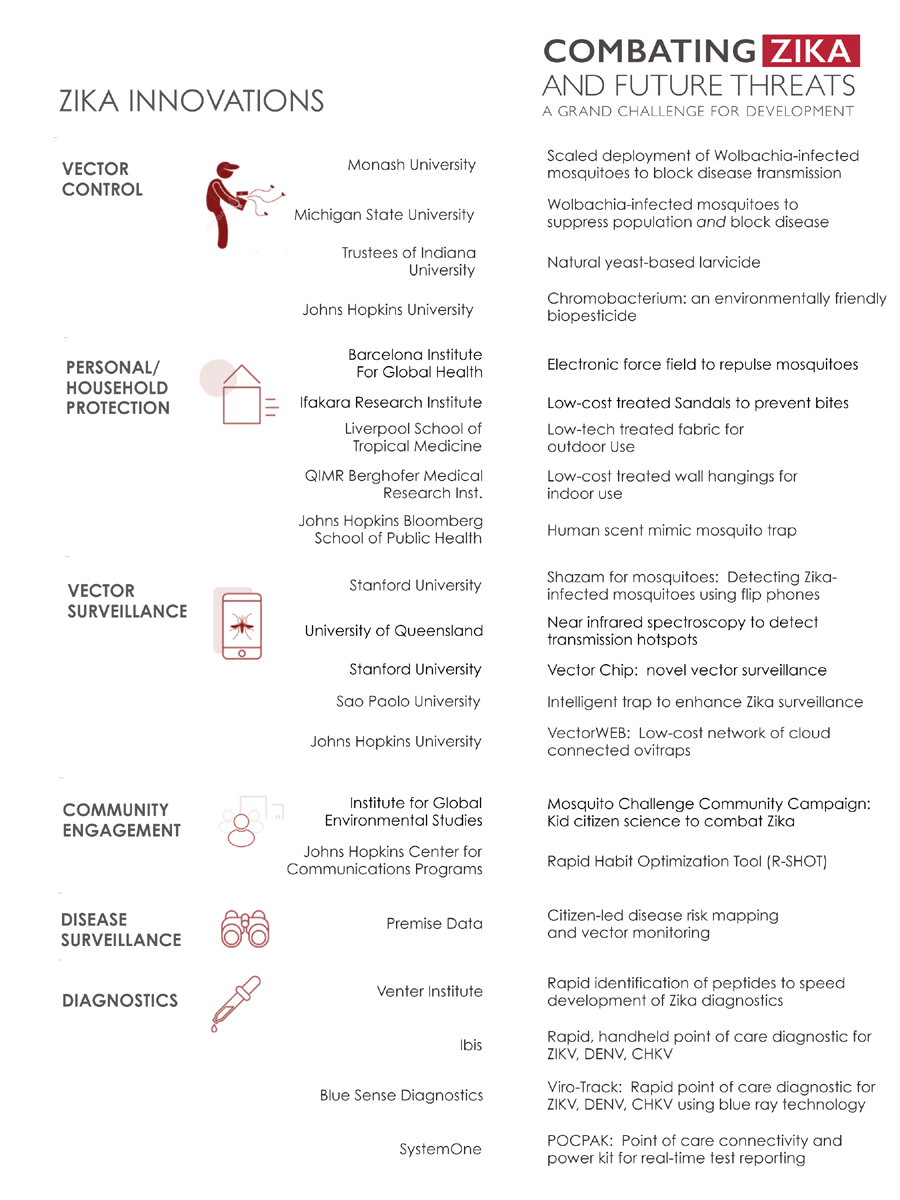To stop the spread of Zika and prevent other infectious disease outbreaks, USAID launched Combating Zika and Future Threats: A Grand Challenge for Development. The $30 million Challenge called upon the global innovator community to generate cutting-edge approaches to fight the current Zika outbreak and to help strengthen the world’s ability to prevent, detect, and respond to future infectious disease outbreaks.
In just nine weeks, USAID received nearly 900 submissions from across the globe in response to the Challenge. Following a rigorous review process, 21 potentially game changing solutions that cut across vector control, personal and household protection, vector and disease surveillance, diagnostics, and community engagement were selected for funding for accelerated development, testing and deployment. Five additional awards have been announced ranging from unmanned aerial vehicles delivering critical medical supplies in remote areas to the use of big data and machine learning to prevent future disease outbreaks.
Zika Innovations |
||
|---|---|---|
| Vector Control | Monash University | Scaled deployment of Wolbachia-infected mosquitoes to block disease transmission |
| Michigan State University | Wolbachia-infected mosquitoes to suppress population and block disease | |
| Trustees of Indiana University | Natural yeast-based larvicide | |
| Johns Hopkins University | Chromobacterium: an environmentally friendly biopesticide | |
| Personal/Household Protection | Barcelona Institute For Global Health | Electric force field to repulse mosquitoes |
| Ifakara Research Institute | Low-cost treated Sandals to prevent bites | |
| Liverpool School of Tropical Medicine | Low-tech treated fabric for outdoor use | |
| QIMR Berghofer Medical Research Inst. | Low-cost treated wall hangings for indoor use | |
| Johns Hopkins Bloomberg School of Public Health | Human scent mimic mosquito trap | |
| Vector Surveillance | Stanford University | MosquitoFreq: Crowdsourced detection of Mosquitoes species using simple Flip Phones |
| University of Queensland | Near infrared spectroscopy to detect transmission hotspots | |
| Stanford University | VectorChip: Design and testing for pathogen identification tools in wild mosquito populations | |
| Sao Paolo University | Intelligent trap to enhance Zika surveillance | |
| Johns Hopkins University | VectorWEB: Low-cost network of cloud connected ovitraps | |
| Community Engagement | Institute for Global Environmental Studies | Mosquito Challenge Community Campaign: Kid citizen science to combat Zika |
| Johns Hopkins Center for Communications Programs | Rapid Habit Optimization Tool (R-SHOT) | |
| Disease Surveillance | Premise Data | Citizen-led disease risk mapping and vector monitoring |
| Dalberg Data Insights | Monitoring population movement to determine areas prone to disease outbreak | |
| Dimagi/Mt. Sinai | Big data and machine-based learning to identify data cold spots to forecast disease hotspots | |
| International Society for Infectious Diseases/ProMED/Imperial College London/HealthMap/healthsites.io | Mapping the Risk of International Infectious Disease Spread | |
| Diagnostics | J. Craig Venter Institute | Rapid identification of peptides to speed development of Zika diagnostics |
| Abbott’s Ibis Biosciences business | Rapid, handheld point of care diagnostic for ZIKV, DENV, CHKV | |
| BluSense Diagnostics | Viro-Track: Rapid point of care diagnostic for ZIKV, DENV, CHKV using blue ray technology | |
| SystemOne | Aspect™ IoT software to prevent future outbreaks | |
| Unmanned Aerial Vehicles | Vayu | Use of UAVs for delivery/pick-up of medical products and samples |
| WeRobotics | Mosquito release mechanism on UAVs to support mosquito control | |








Comment
Make a general inquiry or suggest an improvement.